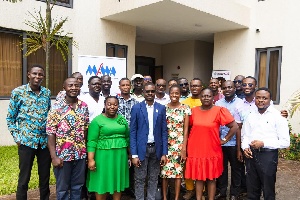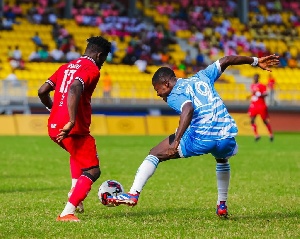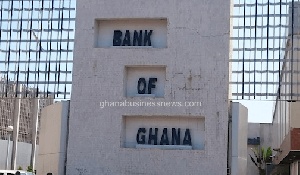- Home - News
- Elections 2024
- News Archive
- Crime & Punishment
- Politics
- Regional
- Editorial
- Health
- Ghanaians Abroad
- Tabloid
- Africa
- Religion
- Photo Archives
- Press Release
General News of Monday, 2 June 2025
Source: www.ghanawebbers.com
MFWA trains journalists to expose illicit financial flows and promote fair taxation in Ghana
The Media Foundation for West Africa (MFWA) is addressing illicit financial flows (IFFs). They have trained Ghanaian journalists to improve their skills in investigating financial crimes and tax injustices.
Ghana loses over US$3 billion each year due to IFFs. These include money laundering, tax evasion, and transfer pricing. This issue is widespread across Africa, which loses an estimated $50 billion annually.
These financial crimes hinder development efforts and worsen poverty. They also contribute to inequality and conflict in the region.
At a training workshop in Kumasi, Edward Cudjoe from the Economic and Organised Crime Office (EOCO) expressed concern about this growing threat. He stated that Ghana is losing billions through IFFs, which affects development funding.
Mr. Cudjoe emphasized the importance of journalists in fighting these crimes. He encouraged them to enhance their investigative skills and expose how public funds are misappropriated.
The training covered legal frameworks related to IFFs and tactics used by offenders. Journalists learned about key international organizations combating financial crimes.
Participants were also educated on progressive taxation. This knowledge helps them understand Ghana’s tax system and its effects on equity.
Nii Addo from Green Tax Youth Africa urged a shift from regressive taxes that burden the poor. He advocated for fairer corporate taxes that do not disproportionately affect vulnerable groups.
Paul Gozo from MFWA highlighted the need for this initiative. He noted a gap in media capacity regarding IFFs and taxation policy.
He explained that many journalists lacked training on these critical issues. The goal is to train 80 journalists to identify IFFs and report effectively on taxation matters.
This training program is part of a broader initiative supported by Oxfam Ghana and DANIDA.











